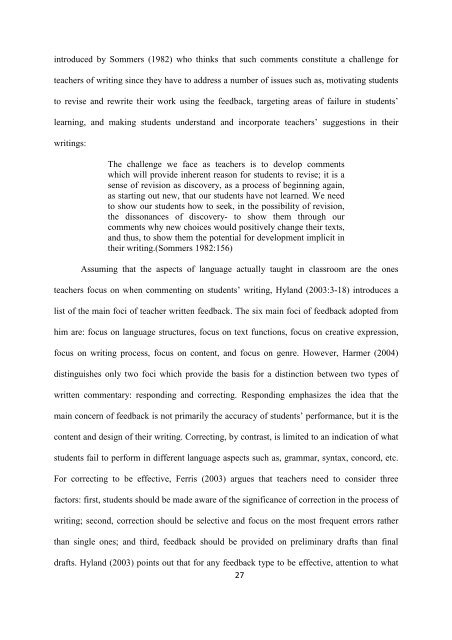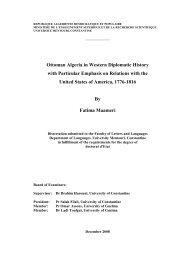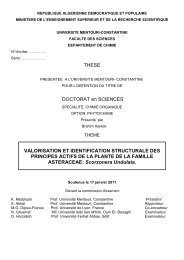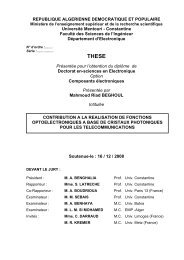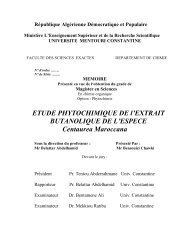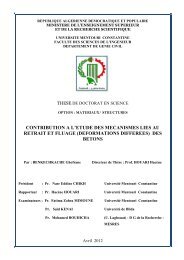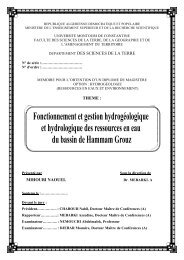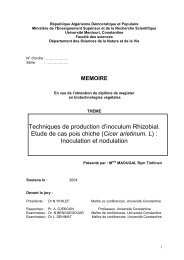Students' Response to Teachers' Feedback on Writing The Case of ...
Students' Response to Teachers' Feedback on Writing The Case of ...
Students' Response to Teachers' Feedback on Writing The Case of ...
Create successful ePaper yourself
Turn your PDF publications into a flip-book with our unique Google optimized e-Paper software.
introduced by Sommers (1982) who thinks that such comments c<strong>on</strong>stitute a challenge for<br />
teachers <strong>of</strong> writing since they have <str<strong>on</strong>g>to</str<strong>on</strong>g> address a number <strong>of</strong> issues such as, motivating students<br />
<str<strong>on</strong>g>to</str<strong>on</strong>g> revise and rewrite their work using the feedback, targeting areas <strong>of</strong> failure in students’<br />
learning, and making students understand and incorporate teachers’ suggesti<strong>on</strong>s in their<br />
writings:<br />
<strong>The</strong> challenge we face as teachers is <str<strong>on</strong>g>to</str<strong>on</strong>g> develop comments<br />
which will provide inherent reas<strong>on</strong> for students <str<strong>on</strong>g>to</str<strong>on</strong>g> revise; it is a<br />
sense <strong>of</strong> revisi<strong>on</strong> as discovery, as a process <strong>of</strong> beginning again,<br />
as starting out new, that our students have not learned. We need<br />
<str<strong>on</strong>g>to</str<strong>on</strong>g> show our students how <str<strong>on</strong>g>to</str<strong>on</strong>g> seek, in the possibility <strong>of</strong> revisi<strong>on</strong>,<br />
the diss<strong>on</strong>ances <strong>of</strong> discovery- <str<strong>on</strong>g>to</str<strong>on</strong>g> show them through our<br />
comments why new choices would positively change their texts,<br />
and thus, <str<strong>on</strong>g>to</str<strong>on</strong>g> show them the potential for development implicit in<br />
their writing.(Sommers 1982:156)<br />
Assuming that the aspects <strong>of</strong> language actually taught in classroom are the <strong>on</strong>es<br />
teachers focus <strong>on</strong> when commenting <strong>on</strong> students’ writing, Hyland (2003:3-18) introduces a<br />
list <strong>of</strong> the main foci <strong>of</strong> teacher written feedback. <strong>The</strong> six main foci <strong>of</strong> feedback adopted from<br />
him are: focus <strong>on</strong> language structures, focus <strong>on</strong> text functi<strong>on</strong>s, focus <strong>on</strong> creative expressi<strong>on</strong>,<br />
focus <strong>on</strong> writing process, focus <strong>on</strong> c<strong>on</strong>tent, and focus <strong>on</strong> genre. However, Harmer (2004)<br />
distinguishes <strong>on</strong>ly two foci which provide the basis for a distincti<strong>on</strong> between two types <strong>of</strong><br />
written commentary: resp<strong>on</strong>ding and correcting. Resp<strong>on</strong>ding emphasizes the idea that the<br />
main c<strong>on</strong>cern <strong>of</strong> feedback is not primarily the accuracy <strong>of</strong> students’ performance, but it is the<br />
c<strong>on</strong>tent and design <strong>of</strong> their writing. Correcting, by c<strong>on</strong>trast, is limited <str<strong>on</strong>g>to</str<strong>on</strong>g> an indicati<strong>on</strong> <strong>of</strong> what<br />
students fail <str<strong>on</strong>g>to</str<strong>on</strong>g> perform in different language aspects such as, grammar, syntax, c<strong>on</strong>cord, etc.<br />
For correcting <str<strong>on</strong>g>to</str<strong>on</strong>g> be effective, Ferris (2003) argues that teachers need <str<strong>on</strong>g>to</str<strong>on</strong>g> c<strong>on</strong>sider three<br />
fac<str<strong>on</strong>g>to</str<strong>on</strong>g>rs: first, students should be made aware <strong>of</strong> the significance <strong>of</strong> correcti<strong>on</strong> in the process <strong>of</strong><br />
writing; sec<strong>on</strong>d, correcti<strong>on</strong> should be selective and focus <strong>on</strong> the most frequent errors rather<br />
than single <strong>on</strong>es; and third, feedback should be provided <strong>on</strong> preliminary drafts than final<br />
drafts. Hyland (2003) points out that for any feedback type <str<strong>on</strong>g>to</str<strong>on</strong>g> be effective, attenti<strong>on</strong> <str<strong>on</strong>g>to</str<strong>on</strong>g> what<br />
27


